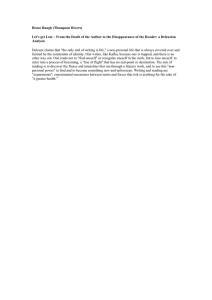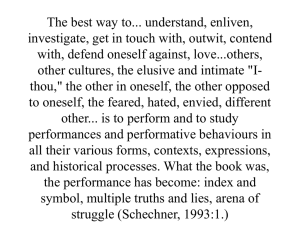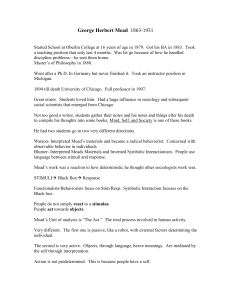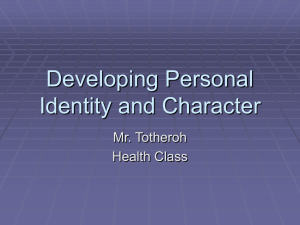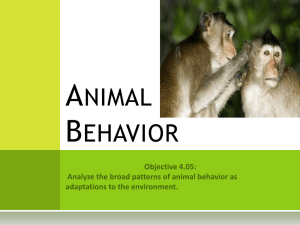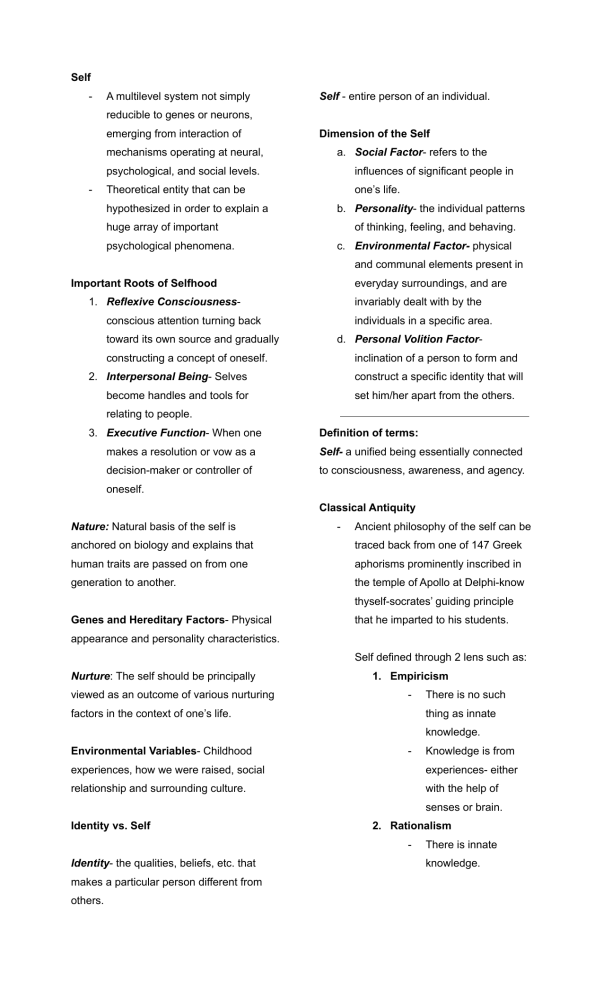
Self - A multilevel system not simply Self - entire person of an individual. reducible to genes or neurons, emerging from interaction of mechanisms operating at neural, - Dimension of the Self a. Social Factor- refers to the psychological, and social levels. influences of significant people in Theoretical entity that can be one’s life. hypothesized in order to explain a b. Personality- the individual patterns huge array of important psychological phenomena. of thinking, feeling, and behaving. c. Environmental Factor- physical and communal elements present in Important Roots of Selfhood everyday surroundings, and are 1. Reflexive Consciousness- invariably dealt with by the conscious attention turning back toward its own source and gradually individuals in a specific area. d. Personal Volition Factor- constructing a concept of oneself. inclination of a person to form and 2. Interpersonal Being- Selves construct a specific identity that will become handles and tools for set him/her apart from the others. relating to people. 3. Executive Function- When one Definition of terms: makes a resolution or vow as a Self- a unified being essentially connected decision-maker or controller of to consciousness, awareness, and agency. oneself. Classical Antiquity Nature: Natural basis of the self is - Ancient philosophy of the self can be anchored on biology and explains that traced back from one of 147 Greek human traits are passed on from one aphorisms prominently inscribed in generation to another. the temple of Apollo at Delphi-know thyself-socrates’ guiding principle Genes and Hereditary Factors- Physical that he imparted to his students. appearance and personality characteristics. Self defined through 2 lens such as: Nurture: The self should be principally viewed as an outcome of various nurturing 1. Empiricism - factors in the context of one’s life. There is no such thing as innate knowledge. Environmental Variables- Childhood - Knowledge is from experiences, how we were raised, social experiences- either relationship and surrounding culture. with the help of senses or brain. Identity vs. Self 2. Rationalism - Identity- the qualities, beliefs, etc. that makes a particular person different from others. There is innate knowledge. - There are different source of innate b. Physical world (body) - knowledge, entity whose nature exists 3. Idealism - Knowledge is Self is fundamentally an intellectual independent from the physical world. - dependent on the He divided the reality into two: a. Ontos (ideal)- ultimate activity of mind. reality which is permanent and spiritual. Three Great “Golden Age” Greek b. Phenomena- the Philosophers 1. Socrates - - - before he was born in the world and man to bring his inner self to was only forgotten due to long exile light. on earth. Bad man is not virtuous - contemplation and doing good, he The man who does not follow can regain his former imperfection. - or a divine exemplar which he recognize it. follows to reach and attain his Socrates Ethics is the density. - imitation of the divine exemplar of deepest and most basic propensity virtue, embodied in man’s former of man. perfect self. Innate in the mind and self-knowledge is the source of all wisdom. 3. Aristotle - individuals may gain possession of oneself. - Happiness, which is the fruit of virtue, is attained by the constant Virtue - A man has a guiding star, a model, because he does not knowledge. - By constant remembering through through ignorance. concept of virtue and - Man is omniscient or all knowing Know yourself; tell each the good fails to do so - manifestation of the ideal. phenomena. - Be one’s own master through knowledge. The ideal is subsumed in the Ideal as essences and phenomena as matter. - The essence provides meaning and the purpose to the matter, and the 2. Plato - matter provides substance and The ideal self, the perfect solidity to essence. self. - An empiricist. His conceptualization of the - All knowledge comes to human self was introduced in his dialogue, Phaedrus. - beings from and through sensation. - Minds start as blank slates and from The main idea of his dialogue sensation we get our ideas or so was that truth can be called “contents” of our mind. distinguished in two forms: a. Metaphysical realm (mind) 4. Immanuel Kant - Respect for self - Man is the only creature who - governs and directs himself and his actions, who sets up ends for All knowledge is derived from human senses. (empiricism) - himself and his purpose, and who Bundle theory- collection of impressions. freely orders means for the a. Impressions- vivid; products attainment of his aims. - of direct experience. Every man is an end in himself and b. Ideas- copies of impressions; should never be treated merely as a - - imaginations. means. - The self is the bundle theory of mind Plain dictum of reason and justice: - Skeptical about the existence of the Respect others as you would self, specifically, on whether there is respect yourself. a simple, unified self that exists over A person should not be used as a time. tool, instrument, or device to - No clear and intelligible idea of self. accomplish another’s private ends. - No single impression of the self exists; rather, the self is just the 5. Rene Descartes - Self is a thinking entity distinct from the body. - thing to which all perceptions are prescribed. - Known for his principle “ Cogito, impression of the self, it should ergo sum.” remain constant over time to Although the mind and the body constitute identity. However, man’s are independent and have their own impressions vary and always functions, man must still use his change. mind to investigate, analyze, - experiment, and develop himself. 6. John Locke - Even if there were such an Personal Identity (the self) is a matter of psychological continuity. A person can never observe oneself w/o other’s perceptions. 8. The Christian or Biblical View of the Self - God created humans Founded on consciousness (memory) and not on the substance - - 9. St. Augustine of either the soul or the body. - Man is of a bifurcated nature. Personal identity is the concept - Two aspect about oneself that evolves over the a. Imperfect (earthly) course of an individual’s life. b. Capable of reaching Identity is not locked in the mind, soul, or body only. He included the immortality - concept of a person's memory. - - Goal of the person: to attain communion with divine (God). Identity is explained by - Real world is where God is. psychological connection between - Earth is only a temporary world. life stages. - Love and Justice as foundation. Tabula rasa. - A virtuous life is a dynamism of love. 7. David Hume 10. St. Thomas Aquinas - Man is composed of matter and b. Objective- observed and form. scientifically investigated. a. Matter (hyle)- common stuff - that makes up everything. b. Form (morpe)- essence of Regarded the self as the embodied subjectivity. - living. It sees human beings neither as disembodied minds (exists w/o body) nor as complex machines, but 11. Gilbert Ryle (British) as living creatures whose - I act, therefore I am. subjectivity (consciousness is - Mind is not separate from the body. actualized in the forms of their physical involvement with the world.) - - Consciousness is both perceiving Analytical behaviorism; theory of mind states that mental concepts and engaging. - can be understood that mental the mind is inseparable from our observable events. bodily, situated, physical nature. - 12. Sigmund Freud The ego is not a master in its own Accepted the idea of mental states but he also suggests that the use of concepts can be understood through - Opposed the cartesian cogito. The body cannot be viewed solely as an object, or material entity of the world. house. - Man is governed by 2 drives; Eros Sociological Perspective of the Self and Thanatos. - Three provinces of the mind: id (desire), ego (reality), superego Cultural Acquisition of a specific learned response among rhesus monkeys. (conscience). A. George Mead 13. Paul and Patricia Churchland - - The social self. Eliminative Materialism- radical claim that ordinary, common sense understanding of the mind is deeply wrong and that some or all of the mental states posited by common - sense do not actually exist. - - Self is nothing else but the brain. - Self is contained entirely within the - Self created through social interaction - Process started in childhood physical brain. with children beginning to Idea that to understand the self, one develop a sense of self at must study the brain, not just the about the same time that mind. they began to learn language. 14. Maurice Merleau-Ponty (French) - Two types of body: a. Subjective- lived and experienced The self is the human capacity to be reflective and take the role of others. - - - Self emerges from social C. Ervin Goofman experiences. It is not part of the - Constructing situation body and it does not exist at birth. - People routinely behave like actors Social experiences involve on stage. Everyday social life communication and the exchange of becomes theatrical. There are roles, symbols. People create meanings. scripts and actions, Daily life as a To understand intention you must series of stagecraft rules. imagine the situation from another person’s point of view. By taking the role of the other: the self is reflective Presentation of the self in everyday life - and reflexive. through interaction. - Stages in Mead’s Theory 1. Preparatory Stage- children the role of a particular other. - Interaction order. Impression Management - mimic/imitate others. 2. Play Stage- children pretend to play Believed that meaning is constructed People are concerned with controlling how others view them Dramaturgy - Focuses on how individuals take on Significant others are the roles and act them out to present a perspective and particular favorable impression to their role that a child learns and audience. internalizes. 3. Game Stage- children play organized games and take on the The self is social construction a. Frontstage- plays different roles perspective of generalized others. everyday and displays different 4. Generalized other- the perspective kinds of behavior depending on and expectation of a network of others that a child learns and then where they are and the time of day. b. Backstage- free from expectations takes into account when shaping and norms that dictate front stage behavior. behavior. 5. Dual nature of the self- the beliefs that we experience the self as both - subject and object the “I” and “me” Each definition of a situation lends itself to a different approach, and the consequences are real. B. Charles Cooley - The looking-glass self - “One’s sense of self depends on seeing one’s self reflected in interaction with others. - The self is a social construction dependent on the situation. William Shakespeare - All the world's a stage, and all the - George Mead’s colleague men and women merely players; - Self develops through our perception they have their exits and their of others evaluation and appraisal of entrances; and one man in his time us. plays many parts. - Self is based on how they believe others perceive them. The Self from the anthropological perspective A. Material Culture- refer to the Filipino- belonging or relating to the national flag, emblem or seal and Philippines, or to its people and culture. those representing all the people ● In the context of citizenship, Filipino simply means membership ● who are part of a nation. B. Non-material Culture- embodies in a nation-state. the shared understanding o a group In the constitution, a citizen is of people when including norms, someone who legally resides in a beliefs, and tradition. country. National Identity- requires the process of self-categorization. Cultural Identity and National Identity In self-categorization, one must identify himself with an in-group and out-groups. Culture - derived from the latin word cultura or cultus meaning care or cultivation. - Analogous to caring for an Brian Morris Anthropology of the Self, - infant. entity but a process that Identity- who the person is - orchestrates an individual’s personal Qualities and traits of an individual that make him or her different from others. He reiterated that the self is not an experience. - As a result of this process, a person becomes self-aware and Cultural Identity- refers to the identity or self-reflective about his place in the feeling of belongingness to a certain culture surrounding world. group. - Individual’s perception about themselves is anchored on race, gender, nationality, religion, ethnicity and language. Cultural Identity Theory - Explains why a person acts and behaves the way he does. - It makes sense of how an individual is influenced by the cultural contexts he is situated in. - A nation is a group of people on the premise of shared customs, traditions, religion, language, art, history, and more. National Identity- refers to the identity or feeling of belongingness to one state or nation. Rupert Emerson- a political scientist defined it as a body of people who feel that they are a nation.

